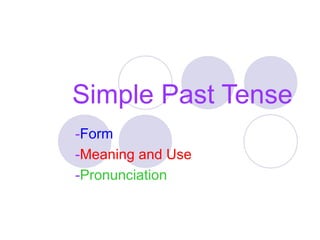
Form, Meaning and Pronunciation of Simple Past Tense
- 1. Simple Past Tense -Form -Meaning and Use -Pronunciation
- 2. How do we form the simple past tense? English has two types of verbs in the past: -regular -irregular
- 3. Let’s read the following list of past tense verbs….. Which are regular and which are irregular? walked regular studied regular taught irregular gave irregular became irregular cried regular lived regular did irregular
- 4. Regular verbs are verbs that end with -ed Simple form verbs: Past tense verbs: walk walked study studied cry cried live lived
- 5. Rules for adding –ed: Add –ed to most verbs Drop the “e” and add “ed” to verbs that end with “e” (smile= smiled). Change the “y” to “i” and add –ed to verbs that end with a consonant and “y” (carry= carried, study= studied). Double the consonant and add –ed to verbs that end with one vowel and one consonant ( drag= dragged, stop= stopped).
- 6. Irregular verbs are verbs that don’t end in –ed…….. Sometimes with irregular past tense verbs you have to change the vowel to make the verb past tense: become became give gave drive drove forget forgot
- 7. Other irregular verbs have a different kind of change…..you need to memorize these! teach taught bring brought leave left hear heard buy bought
- 8. Why do we use past tense verbs? TO TELL THAT AN ACTION IS COMPLETED!!!!!! FINISHED!!! OVER!!!
- 9. PRONOUNCIATION OF REGULAR VERBS…… The –ed ending in English has three different sounds: t: walked, talked, jumped d: played, loved, answered id: invited, waited decided.... *With –id sounding words, there is another syllable!
- 10. How can you practice past tense verbs? Phonemically (word sorts) Bingo! Modeling Survey says…… Nancy Fetzer……… Direct instruction + muiltiple opportunities to practice = Skill mastery!!!!!
